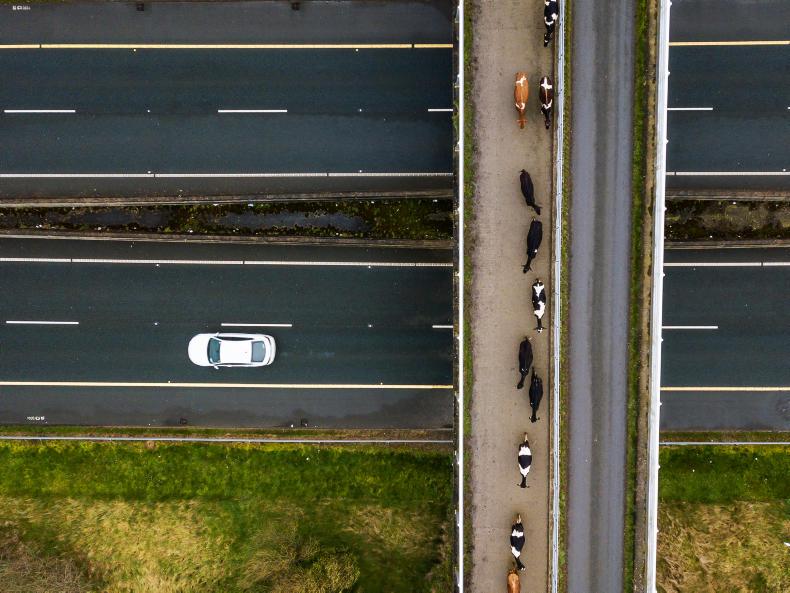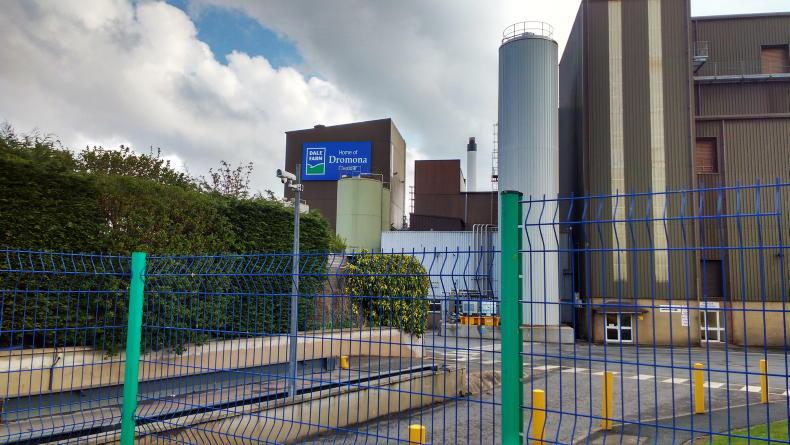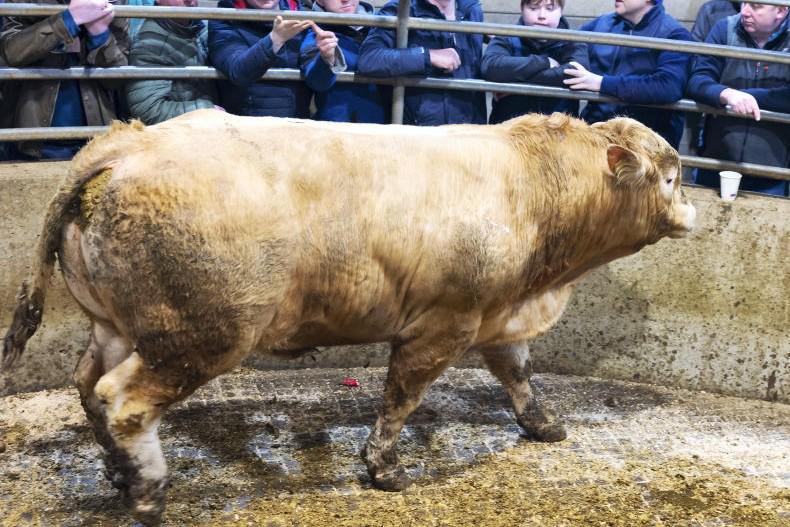With cow numbers increasing, especially in the south and south east of the country, peak milk processing is dependent on everything remaining operational.
There are at least two weeks every year when every milk processing plant is pretty full to capacity.
In the recent past there have been issues at peak, but, there has been enough flexibility and neighbourly help between businesses to cope.
Peak incidence of a virus in people coinciding with the peak milk supply of cows potentially could lead to a very difficult situation if a major milk processing unit was not able to operate.
Speaking to the chairs of co-ops up and down the country on Saturday, at the moment, there are no plans in place to impose yield reduction strategies (ie once-a-day milking) on milking cows.
Of course that could all change in a couple of weeks, or could it? I don't think so. Nobody knows what level of coronavirus incidence will happen in staff working in milk processing units. Large-scale staff absenteeism could take out a processing plant, but, in my opinion once-a-day milking is unlikely to play a big part in solving such a problem – either short- or long-term. Farmers would be better off taking the loss as it happens rather than trying to impose yield reduction strategies that potentially could have far longer negative implications.
Flexibility
If large-scale sickness happens within businesses, there are specialised roles within milk processing like cheese makers etc which could prove the weak link in the chain. However, all processors can do at the moment is retrain staff to improve flexibility, de-risk teams by shift working and cleaning, make contact with recent retirees that may help in the case of an emergency, and follow best practice COVID-19 guidelines.
Have you plans to impose milk yield reducing strategies?
“Once-a-day milking is a last resort as far as I’m concerned. It’s not practical, production is one thing, fertility is another and farmers need to be able to feed cows properly during these critical weeks. It’s not something on our ‘to-do’ list for farmers at the moment. In my view it’s foolhardy at farm level but of course we don’t know what’s around the corner and we are dependent on the goodwill of our staff to keep the show on the road at the processing side of things.” – John O’Gorman, Dairygold Co-op chair.
“Never before has the co-operative structure worked better in Ireland than in times of crisis, and never before has it worked better than it is working today. All contingency plans have been developed to continue processing milk as best we can.” – Pat Duffy, Aurivo Co-op chair.
“We have no plan for reducing yields from cows as far as Lakeland are concerned. We are working with neighbours and planning with neighbours but at this point in time we have no plans to cut milk.” – Alo Duffy, Lakeland Dairies Co-op chair.
“At the moment no we have no plans to impose milk yield reduction strategies on farmers but I’m saying that not knowing what is going to happen in three weeks’ time. We are working to rapidly train up employees into certain key roles that would work in an emergency situation. However, at the moment I’d urge farmers to keep calm, follow HSE guidelines and observe social distancing and look after each other and our families that must be priority.” – TJ Sullivan, Carbery Co-op chair.
“We’ve no plans at the moment on telling farmers to milk once a day. We are talking to stakeholders, government and Department and hoping plants all remain operational. We are trying to make sure we have enough capacity if key people were out etc. As we look forward to mid-April and mid-June it is a risk period for an extended outage and if something happened then a national response will be needed and we will play our part if it is needed. Huge recognition is due to all staff in branches and in processing units, but, also to farmers that are going beyond the call of duty.” - Martin Keane, Glanbia chair.
Read more
Once-a-day milking could cost Irish dairy farmers €17,000 each
With cow numbers increasing, especially in the south and south east of the country, peak milk processing is dependent on everything remaining operational.
There are at least two weeks every year when every milk processing plant is pretty full to capacity.
In the recent past there have been issues at peak, but, there has been enough flexibility and neighbourly help between businesses to cope.
Peak incidence of a virus in people coinciding with the peak milk supply of cows potentially could lead to a very difficult situation if a major milk processing unit was not able to operate.
Speaking to the chairs of co-ops up and down the country on Saturday, at the moment, there are no plans in place to impose yield reduction strategies (ie once-a-day milking) on milking cows.
Of course that could all change in a couple of weeks, or could it? I don't think so. Nobody knows what level of coronavirus incidence will happen in staff working in milk processing units. Large-scale staff absenteeism could take out a processing plant, but, in my opinion once-a-day milking is unlikely to play a big part in solving such a problem – either short- or long-term. Farmers would be better off taking the loss as it happens rather than trying to impose yield reduction strategies that potentially could have far longer negative implications.
Flexibility
If large-scale sickness happens within businesses, there are specialised roles within milk processing like cheese makers etc which could prove the weak link in the chain. However, all processors can do at the moment is retrain staff to improve flexibility, de-risk teams by shift working and cleaning, make contact with recent retirees that may help in the case of an emergency, and follow best practice COVID-19 guidelines.
Have you plans to impose milk yield reducing strategies?
“Once-a-day milking is a last resort as far as I’m concerned. It’s not practical, production is one thing, fertility is another and farmers need to be able to feed cows properly during these critical weeks. It’s not something on our ‘to-do’ list for farmers at the moment. In my view it’s foolhardy at farm level but of course we don’t know what’s around the corner and we are dependent on the goodwill of our staff to keep the show on the road at the processing side of things.” – John O’Gorman, Dairygold Co-op chair.
“Never before has the co-operative structure worked better in Ireland than in times of crisis, and never before has it worked better than it is working today. All contingency plans have been developed to continue processing milk as best we can.” – Pat Duffy, Aurivo Co-op chair.
“We have no plan for reducing yields from cows as far as Lakeland are concerned. We are working with neighbours and planning with neighbours but at this point in time we have no plans to cut milk.” – Alo Duffy, Lakeland Dairies Co-op chair.
“At the moment no we have no plans to impose milk yield reduction strategies on farmers but I’m saying that not knowing what is going to happen in three weeks’ time. We are working to rapidly train up employees into certain key roles that would work in an emergency situation. However, at the moment I’d urge farmers to keep calm, follow HSE guidelines and observe social distancing and look after each other and our families that must be priority.” – TJ Sullivan, Carbery Co-op chair.
“We’ve no plans at the moment on telling farmers to milk once a day. We are talking to stakeholders, government and Department and hoping plants all remain operational. We are trying to make sure we have enough capacity if key people were out etc. As we look forward to mid-April and mid-June it is a risk period for an extended outage and if something happened then a national response will be needed and we will play our part if it is needed. Huge recognition is due to all staff in branches and in processing units, but, also to farmers that are going beyond the call of duty.” - Martin Keane, Glanbia chair.
Read more
Once-a-day milking could cost Irish dairy farmers €17,000 each










SHARING OPTIONS